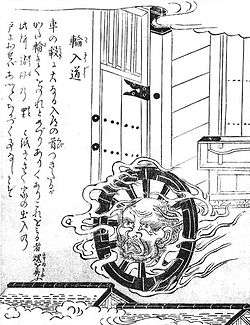Wanyūdō
Wanyūdō (Japanese: 輪入道 literally "wheel (輪) monk (入道)"), also known as "Firewheel" or "Soultaker",[1] is a figure in Japanese mythology, a relatively well-known yōkai in the folklore of Japan; earliest reports of Wanyūdō date back to the Heian period.

Description
Wanyūdō takes the form of a burning oxcart wheel bearing the tormented face of a man. Various folklore purports him as the condemned soul of a tyrannical daimyō who, in life, was known for having his victims drawn on the back of an oxcart. He is said to guard the gates of Hell, and to wander back and forth along the road between this world and the underworld, scaring townsfolk as he passes and stealing the souls of anyone who gets too close in order to bring them to Hell with him.
Legends
One of the most famous legends comes from Kyoto, Japan. As Wanyudo rolled through the town, a woman peeked out her window at him. Wanyudo told her “Instead of looking at me, have a look at your own child!”
She looked down at her baby to find him lying on the floor in a pool of blood with his legs missing.
When she looked back outside at the demon, she saw her baby's legs in his mouth as he ate them.[2]
Modern appearances
Video games
- Yomawari – survival horror game for PlayStation
- Megami Tensei – series of role-playing games
- Kenseiden – action RPG for Master System
- Ōkami – action-adventure game for PlayStation 2 (2006)
- Nioh - action RPG
- Demon Blade - Japanese Samurai RPG
Television and film
- Gegege no Kitaro – anime series (2018)
- Hell Girl – manga, anime, video game
- Kamen Rider – manga and anime series
- Gantz: O - CGI anime movie
See also
- Japanese mythology in popular culture
- Ixion
- Buer (demon), a similar creature from Christian mythology
References
- Bane, Theresa (2016). Encyclopedia of Spirits and Ghosts in World Mythology. Jefferson, North Carolina: McFarland & Company, Inc. pp. 121–2. ISBN 978-1-4766-6355-5.
- "Wa nyūdō". Yokai.
